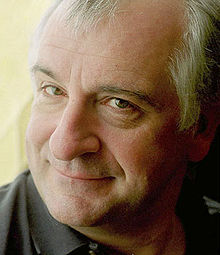
Back Douglas Adams Afrikaans دوغلاس آدمز Arabic دوجلاس ادامز ARZ Douglas Adams AST Duqlas Adams Azerbaijani داقلاس آدامز AZB Дуглас Адамс Bashkir Douglas Adams BAR Дуглас Адамс Byelorussian Дуглас Адамз BE-X-OLD
Douglas Adams | |
|---|---|
 | |
| Born | Douglas Noel Adams 11 March 1952 Cambridge, England |
| Died | 11 May 2001 (aged 49) Montecito, California, US |
| Resting place | Highgate Cemetery, London, England |
| Occupation |
|
| Alma mater | St John's College, Cambridge |
| Genre | Science fiction, comedy, satire |
| Notable work | The Hitchhiker's Guide to the Galaxy |
| Notable awards | Inkpot Award (1983)[1] |
| Spouse |
Jane Belson (m. 1991) |
| Children | 1 |
| Relatives | Benjamin Franklin Wedekind (great-grandfather) |
| Signature | |
 | |
| Website | |
| douglasadams | |
Douglas Noel Adams (11 March 1952 – 11 May 2001) was an English author, humourist, and screenwriter, best known as the creator of The Hitchhiker's Guide to the Galaxy (HHGTTG). Originally a 1978 BBC radio comedy, The Hitchhiker's Guide to the Galaxy developed into a "trilogy" of five books which sold more than 15 million copies in his lifetime. It was further developed into a television series, several stage plays, comics, a video game, and a 2005 feature film. Adams's contribution to UK radio is commemorated in The Radio Academy's Hall of Fame.[2]
Adams also wrote Dirk Gently's Holistic Detective Agency (1987) and The Long Dark Tea-Time of the Soul (1988), and co-wrote The Meaning of Liff (1983), The Deeper Meaning of Liff (1990) and Last Chance to See (1990). He wrote two stories for the television series Doctor Who, including the unaired serial Shada, co-wrote City of Death (1979), and served as script editor for its 17th season. He co-wrote the sketch "Patient Abuse" for the final episode of Monty Python's Flying Circus. A posthumous collection of his selected works, including the first publication of his final (unfinished) novel, was published as The Salmon of Doubt in 2002.
Adams was a self-proclaimed "radical atheist", an advocate for environmentalism and conservation, and a lover of fast cars,[3] technological innovation, and the Apple Macintosh.
- ^ "Inkpot Award". 6 December 2012.
- ^ "The Radio Academy Hall of Fame". The Radio Academy. Archived from the original on 5 December 2011. Retrieved 8 December 2011.
- ^ "Douglas Adams: Master of his universe". The Independent. 19 April 2005.